Peter MALONE
Ruby's Choice
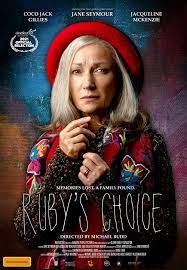
RUBY’S CHOICE
Australia, 2022, 117 minutes, Colour.
Jane Seymour, Jacqueline McKenzie, Coco Jack Gillies, Stephen Hunter, Michael Budd, Nicole Pastor, Brendan Donaghue, Rory Potter, Tim Omaji.
Directed by Michael Budd.
Over the years there have been quite a number of films about the elderly, about the development of senility, about the coming on of dementia and its consequences. This is one of those films.
Ruby is played by Jane Seymour, veteran British actress, so popular on American television. Ruby migrated to Australia in the 1960s with her parents, when she was a teenager. She eventually settled, married, had a daughter, Sharon (veteran Australian actor, Jacqueline McKenzie). However, living by herself, she becomes forgetful, a fire caused by leaving cooking on the stove, needing to move in with her daughter, her son-in-law and granddaughter. And, at the same time, cousins have a crisis and father and son also move into the house, causing crowding, and the granddaughter’s resentment at having to share with her grandmother.
In many ways, the situations are familiar. There is also the awkward background of the husband in danger of losing his job – which eventually he does.
Audiences will have great sympathy with Ruby, driving her car to the library, forgetting it is there and getting the bus home. She goes to the cinema and the ticket seller knows her well and knows that she likes seeing Red Dog, every time she watches it like a first-time. It is clear to the audience that Ruby is in need of some kind of constant care.
Sharon, however, is devoted to her mother and resists the thought of her mother going into aged care, the cliched that these places are terrible.
So, a lot of the film focuses on day-by-day detail in the house, Ruby left at home first with some chores, conscious of having to feed the fish which she does, and does, the fish and dying to her granddaughter’s dismay. Then the granddaughter having to stay home to keep an eye on her grandmother – although, they do go out and enjoy themselves. Then the husband stays home but goes to the unemployment centre, Ruby going to the toilet – and then disappearing, the whole family out to search for her and rescuing her from some bullies mocking her.
By this stage, audiences will be acutely conscious of Ruby’s needs, of Sharon’s reluctance for her going to care, but realising that the family is unable to keep a constant eye on Ruby and, checking with agencies, that they cannot afford this kind of care.
Because the thrust of the film is to highlight care for the aged, it has to have a happy ending, nicely done when the family all visit an aged care home and Ruby finds a friend from the past and is content to be with her.
Some background information from the website: Ruby’s Choice was inspired by writer and producer Paul Mahoney’s work as a disability case manager and was directed by Michael Budd, who was inspired to make the movie after losing his grandma to dementia.
A portion of the movie’s profits will go to Dementia Care International and its charity arm Dementia Foundation for Spark of Life – from the Glen Family Foundation which contributed to the budget of the film -transforming the lives of people with dementia all across Australia. As the official charity partner for the film, they worked to ensure the story reflected real-life experiences of families dealing with dementia.
In 2022, there were an estimated 487,500 Australians living with dementia, according to researched undertaken by the National Centre For Social And Economic Modelling (NATSEM), University of Canberra.
- The title, the focus on Ruby, her life, ageing, dementia, aged care crisis, her choice?
- The Sydney settings, the suburbs, home, grounds, streets, shops, library, cinema, school, offices, aged care homes? The feel of the suburb and suburban life? The musical score?
- Ruby’s story, migration to Australia, her parents, not settling, meeting Frank, embracing Australia as home, marriage, Sharon, life together? Frank’s death and her not realising it? Waiting for him to come home? The manifestations of her dementia, the fire in the kitchen, going to see Red Dog over and over again, driving to the library, getting the bus home? Chats with her neighbours?
- Sharon and the family, Doug , mechanic, employment, precarious, eventually losing his job, Tash, age, school? Sharon at work, financial issues? The personalities?
- The crisis, Ken and Ned coming, the marriage breakup, Ned as a surly teenager? Not wanting to be there? Missing his mother? Strong relationship with his father?
- Ruby, the fire, Sharon coming, taking Ruby home, dealing with Ruby, her awareness in the present, her waiting for Frank, the dementia setting in? Sharon wanting to care for her mother, not wanting her to go to aged care? The grim perceptions of aged care homes?
- The day at home, the chores, feeding the fish, overfeeding the fish, leaving the iron on the shirt…? Tash, upset about the fish, letting the bird go free, sharing the room with her grandmother? Their talking together in the room? Sharon asking Tash to stay home and look after her grandmother, the initial reaction, at home, going out together, going to the cinema, seem Red Dog, ice creams, the walk? Tash enjoying it?
- School, the bullies, the Asian student ‘n is liking Tash? Ned and his teaming up with the bullies? In the bus, humiliations? The Asian student, confronting the bullies, their standing back?
- Doug caring for Ruby, losing his job, pottering around with all his repairs, being a hoarder? Going to the office, Ruby going to the toilet, the official not noticing, Ruby wandering, the whole family searching, Ruby and her being bullied by the young men? Tash and her intervention, after being coached by Ruby?
- And the discovery of the information about Sharon, the adoption, going to the library, research? Certificates? The revelation of the truth, the effect on Sharon?
- The growing dilemmas, Sharon and her going to the aged care people, the discussions, the costs?
- The realisation that aged care was needed, the whole family going to the home, Ruby seeing her friend from the past, their chatting, comfortable, enabling Ruby to make her decision about staying at the home?
- A happy ending, for the purpose of the film, a more sympathetic vision of dementia, the need for specialised care, aged care accommodation?
Murder to Remember, A/ Ann Rule's Murder to Remember
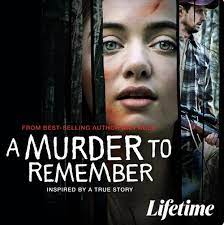
A MURDER TO REMEMBER/ANN RULE'S A MURDER TO REMEMBER
US, 2020, 85 minutes, Colour.
Carolyn McCormick, Maddie Nichols, Leslie Hendrix, T.C.Matherne, Kevin Tyler Rodriguez.
Directed by Robin Givens.
This is a thriller from Lifetime, a version of a popular novel by Ann Rule, several of whose other novels have been filmed. It is based on actual characters and events, contributing to understanding of the Stockholm Syndrome.
This is very average entertainment, more for an undemanding audience.
The film opens with an anxious couple driving to town, approaching the police to report a hunting accident, the wife of one year very upset, her being escorted by the hunter who has accidentally killed her husband.
With the interrogation by the police, the film goes into flashback, a very happily a couple celebrating the anniversary, camping, fishing, encountering a young man whose car has been bogged, who advises them on where to fish, urging them to camp during the night, seeing a deer, then the accident.
What happens is that the wife begins to regain some memories, five days in the woods after the death, her blaming the man for deliberately killing her husband. She has a very strong mother who takes her part. There is a strong local sheriff who does polygraph tests on both characters, has to confront the mother, examines the background of the man and finds that he is an unsavoury character. He on the other hand brings his lawyer and defies everyone.
There are more and more memories, the man persuasive, sexual intimacy, persuading her to believe that her husband was accidentally killed. Ultimately, the wife gets the courage to testify after refusing, confronts the man who is then taken away for trial.
A significant theme about male violence towards women, psychopathic murderous behaviour, the effect on women in terms of the Stockholm syndrome.
World according to Dick Cheney, The
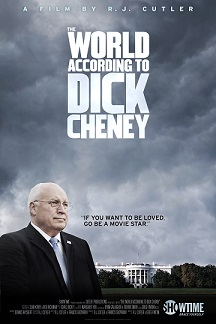
THE WORLD ACCORDING TO DICK CHENEY
US, 113, 109 minutes, Colour.
Directed by R.J.Cutler.
This very interesting documentary was made within five years of the end of Dick Cheney’s eight years as vice president for George W.Bush.
At the time, the first year of President Obama’s second term, those who shared Dick Cheney’s hawkish views, especially about Iraq, weapons of mass destruction, the invasion, will listen to his words, look at his face and expressions, and be supportive. Those who do not share Cheney’s views will listen to him, his calm presentation of what he believed, his methods, and might well be appalled.
The film does fill in some of his background, from Wyoming, dropping out of Yale twice, drinking, arrests, love for Lynne who made demands on him, eventually leading to his rehabilitating himself, marrying her, studying, political science, and a meeting with Donald Rumsfeld when he was in his early 30s, leading to work with President Gerald Ford and a constant presence in Washington. (For some further elaboration on this period and his actual ups and downs, they are treated in the feature film about Cheney, Vice, with Christian Bale.)
This documentary highlights the impact of 9/11, the fact that Cheney was in Washington while George Bush was in Florida, his handling of the situation on the spot. Then there is his attitude towards Al Qaeda, the link with the Iraq, hostility towards Saddam Hussein, collecting the evidence of weapons of mass destruction (including the spurious information about Iraq buying uranium from Africa), the advice to the President, the speeches in Congress, the vote and discussion, the invasion. There are some graphic pictures of warfare in Iraq.
There is also a treatment of the torture of those interned at Guantanamo Bay, waterboarding, other torches, Abu Grabe. There are consequences for Donald Rumsfeld, hostility towards him, leading to his resigning from his post – and the film featuring Dick Cheney’s eulogy of Rumsfeld on this occasion, praising his greatness as Defence Secretary and as a personal friend.
It is clear that Dick Cheney was a fairly single-minded Hawk. His antipathy towards middle eastern countries, the invasion of Afghanistan, the buildup to the invasion of Iraq, the toppling of Saddam Hussein is very clear and spoken directly, without hesitation, seemingly without scruple. A great deal of attention is given to his dislike of having to go to Congress (remembering Gerald Ford’s rather humiliating treatment after his pardoning of Nixon). Cheney manipulates behind-the-scenes, alienates the attorney general and his assistant, keeps the president in the dark. However, this backfires on Cheney and the bonds between the president and the vice president cool considerably.
As expected, Cheney has no regrets and would do everything over again in the same way.
The film grows in interest as the years passed and there is the opportunity to look back over the events and the characters in the Bush administration.
The Dir, R.J.Cutler, has a strong record of substantial documentaries.
(There have been many feature films about Dick Cheney and the Bush administration, with Richard Dreyfus in W, Christian Bale in Vice. Operation Secret, with Kiera Knightley, is interesting in terms of British intelligence and weapons of mass destruction. There is The Green Zone in the aftermath of the invasion of Iraq and the issue of weapons of mass destruction. As regards the torture issue, there is The Report that was prepared for the American Congress, Zero Dark Thirty leading up to the capture of Osama bin Laden, the Mauritanian and issues of torture in Guantánamo as well as Alex Gibney’s Oscar-winning documentary, Taxi to the Darkside.)
North Hollywood
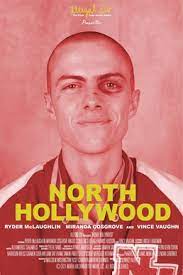
NORTH HOLLYWOOD
US, 2021, 93 minutes, Colour.
Ryder McLaughlin, Vince Vaughn, Miranda Cosgrove.
Directed by Mikey Alfred.
The target audience for this film seems to be the range of actual characters in the film itself, senior high school students. The film would not be of particular interest to these characters once they turn 20, nor for any audiences over 20.
It is a comedy-drama, focusing on the high school teenager, played by Ryder McLaughlin, in many ways physically awkward, getting into fights and losing, but whose main ambition is to be a professional skateboard rider. The film has many scenes of skateboarding.
However, he seems to be a disappointment from his self-made father, severe, perhaps an enticement for an older audience because he is played by Vince Vaughn. There are many scenes of the father being demanding on the son, criticising his of juices and awkwardness.
There is a whole range of high school students, Miranda Cosgrove as a potential girlfriend, sympathetic, teachers, coaches.
Rather unusual is the emphasis on religion, a sequence in a church, with a mixum-gatherum of rituals of prayer, intercessions, communion, the hero distributing communion, especially to the girl, and a rather deadpan homily by the priest. The hero is one of the altar servers but is reaching the age when he has to give up for younger servers and he is unwilling. There is a scene of grace before meals, demanded by the father. And there is a scene at home where the hero actually praise. However, his fellow altar servers don’t give the impression that they have a religious thought in their heads!
Ultimately, there is some moralising, frank talks between father and son, the father’s regrets, lover’s son, the son feeling free to fulfil his dreams of skateboarding.
A film of quite limited appeal in topic and in treatment.
Die in a Gunfight
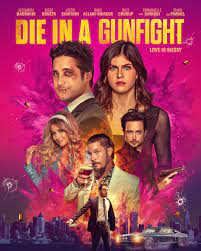
DIE IN A GUNFIGHT
US, 2021, 92 minutes, Colour.
Diego Boneta, Alexandra Daddario, Justin Chatwin, Wade Elaine-Marcus, Emmanuelle Chriqui, Travis Fimmel. Narrated by Billy Crudup.
Directed by Collin Schiffli.
The title sounds as if it should be for a Western. However, it is a contemporary drama.
What is distinctive about the film is its visual style and way of narrative. It opens like the visualising of a graphic novel, the sketches, the characters, action. It is a comicstrip narrative, focusing on the central character, Ben, but allowing himself to be bullied, and stating that he would like to die in a gunfight.
The screenwriters have an eye on Romeo and Juliet, Capulets and Montagues, this time tycoons who have been in conflict since the 19th century, duels, rivalries, building up huge media empires and buildings. One family disapproves of its son, Ben, his rebellion. The other family is exasperated with its daughter, Mary, bad behaviour, expelled from schools, sent to Paris to improve herself. On her return, Ben and Mary meet again, explanations, bonding, love, and build up to a wedding ceremony.
The film is narrated by Billy Crudup.
Diego Boneta is Ben and Alexandra Daddario is Mary. Justin Chatwin appears as the sinister minder, intent on marrying Mary, linked with thugs. There is also a mysterious couple, the Australian-accented Wayne and his girlfriend Barb, Wayne played by Travis Fimmel. He provides something of a 21st-century graphic novel Shakespearean commentator with a touch of violence and a touch of humour.
This is the kind of film that critics tend to turn up their noses at. It is also the kind of film, especially with the graphic novel sensibilities that appeal to a younger, graphic novel and computer games audiences.
- The title? The hero’s ambition? And achievement!
- The American city, the world of affluence, media empires, mansions, the contrast with dark streets and neighbourhoods, small apartments? A trip to Paris? The musical score?
- The visual style and mode of communication, reliance on the style of the Graphic Novel, animation, depiction of characters, situations, comicstrip panels? Bright colour? The transition to realism and back again? The target audience with this style? Younger, graphic novel fans?
- The credibility of the plot, stylised, love, separation, out of love, reuniting? The variation on Romeo and Juliet and the Capulets and the Montagues?
- The background of the families, the 19th century, wealth, duels, betrayals, enmity? The 20th century tradition, empires, media, buildings? Influence? The 21st-century, rivalries, yet collaborations? Government investigations? The hiring of thugs?
- Ben’s story, the introduction, his background, growing up, in fights, bullied, challenges, wanting to die in a gunfight? The pressure from his parents? Leaving home, his friends, drinking, drugs, gatecrashing parties? Leaving home? Love for Mary, her sudden disappearance, his communication, no replies? Going to Mexico, the graphic novel incident and his falling on Mukul? Their bonding? His return? Meals, his parents, reactions? Love for his mother?
- Mary’s story, wealthy, schools, behaviour, expelled, parents exasperated, her love for Ben, the separation, her writing, no replies? Behaviour, friends, wildlife? Return home? Meeting Ben again, talk, explanations, reuniting love?
- Ben, the encounter with Wayne and Barb, Wayne and his talk, the Australian accent, calling Ben rabbit, the fights? The later encounters, his being commissioned to follow Ben, the fight with the thugs? Besting them? The final confrontation, the security guard, leaving Barb in the car, his death?
- Terrance, commissioned to follow Mary, Paris, his declaration of love? Her return, her father’s employing him, tough encounters, the thugs, asking Mary to marry him, trying to persuade her father? With Wayne? Information about the wedding, hurrying to the site, guns, confrontation, Wayne’s death, Mary shooting him?
- Ben’s mother, the news of the wedding, wanting the dress, helping Mary, Mary’s mother and the phone call? The wedding, the intrusion, confrontations, the shootings?
- The Romeo and Juliet kind of ending? In a graphic novel way?
Initiation/ 2020

LOVE AND OTHER DISASTERS
UK, 2006, 90 minutes, Colour.
Brittany Murphy, Matthew Rhys, Catherine Tate, Santiago Cabrera, Elliot Cowan, Stephanie Beecham, Jamie Sives, Will Keen, Michael Lerner, Dawn French, Richard Wilson, Adam Reina, Angus Dayton, Gwyneth Paltrow, Orlando Bloom.
Directed by Alek Keshishian.
It would seem that writer-director Alec Keshishian (who had a 30 year career of doing music videos for such talent is Robbie Brown, Elton John, Madonna, Selena Gomez) had an eye on Richard Curtis’ screenplay for Love, Actually. In fact, there is a clip in this film from his screenplay of Notting Hill. There are also scenes from breakfast at Tiffany’s and replays of Moon River.
There are several stories going on at once in the screenplay, but the principal focus on Jacks, on the staff at Vogue Magazine, supervising fashion photography. She is played with verve by Brittany Murphy (sadly dying three late years later after the release of this film). The other focus of attention is on Peter, gay writer (Matthew Rhys before he went to the US and became prominent on television with The Americans and Perry Mason). Jacks is in a relationship with her former boyfriend and seems unable to get out of it. Peter has relationships in his imagination.
Also in the cast is Catherine Tate, well-known for her television satirical performances. Santiago Cabrera is the leading man. Audiences will be pleased with cameos from a range of character actors including Stephanie Beecham is Catherine Tate’s dominating mother, Michael Lerner is a bombastic Hollywood producer (did the filmmakers have Harvey Weinstein in mind at that time), Dawn French as a therapist who is not unlike her Vicar of Dibley persona, and Richard Wilson, doing an acerbic One Foot in the Grave turn as a marriage registrar.
The film acknowledges the conventions of romantic comedies, opening with screenplay instructions printed on the screen and ending in this way. The Hollywood producer wants big Hollywood style entertainment and romance in the characters remarking at times on what audiences might be expecting if this film were Hollywood romance. And, at the end, with the suggestion that Gwyneth Paltrow and Orlando Bloom could be the main characters, they actually appear at the airport climax!
The film struggles with heterosexual relationships – and there is quite some focus on gay relationships.
- Title? In relationship to all the characters? To the final screenplay in film?
- The London settings, flats, businesses and offices, fashion shoots, options, restaurants, hotel lobbies…? Atmosphere? And the musical score (and replaying Moon River)?
- The variety of characters, situations and interactions? Relationships? Straight relationships? Gay relationships? Tangles?
- Jacks’ story, her background, London and the US, her accent, her relationship with James, ex-boyfriend, but continued contact, his stands, love for Jacks or not? Her wanting to end the relationship but not succeeding? The work, her friends, the friendship with Tallulah and her eccentricities, her mother, coping with Tallulah? Sharing the flat with Peter, studying together, her encouraging him? Her friendship with Finley, the Gallery? Going to the exhibition of the pork carcasses? Sasha, the photo shoots, his moodiness, encountering Paolo, misinterpreting him, the later conversation, apology, dancing the Tango? Thinking him gay, encouraging Peter?
- Peter story, gay, journalism, the thwarted interview with the American producer, later meeting him, the screenplay, the producer wanting it very much more Hollywood? The encounter with the man who dropped the parcel, his misinterpretation of the address? Everybody telling David about Peter? Peter always missing him? The encounter with Paolo, the attraction, friendship, Paolo telling him he was straight? Dealing with Tallulah and her tantrums? Finally writing the screenplay?
- Tallulah, Catherine Tate’s comic style, eccentricities, the relationship with Freedom, his being married? The man on the phone from British Telecom? Her disdain for her mother? Have the auction, meetings of the dress? The collapse, Jacks and Peter looking after her?
- Tallulah’s mother, fashion, age, finance, the auction?
- Finley, the Gallery, gay, friendship with Peter?
- Paolo, Argentina, photography, his portfolio, realistic? Jacks misinterpreting his relationship, is trying to tell the truth and her continually interrupting? Her provocative behaviour with him, thinking he was gay? The encounters with Jacks, her apology, the Tango? His being reported to the authorities, deportation, Jacks proposal, the wedding ceremony, interrupted, Paolo leaving for the airport?
- Peter telling Jacks the truth, her fear of relationships? Going to the airport, missing Paolo? Her flight to Argentina?
- David, the encounter with Peter, the misinterpretation of his identity, the meeting with Tom, vain actor, the night with Peter, the chance encounter in the Underground with David, Peter following him, the relationship?
- The film, Gwyneth Paltrow and Orlando Bloom, everybody watching the film?
- Jacks pregnant, happy with Paolo, Peter and William, in the final screenplay indications and final shot?
Love and Other Disasters
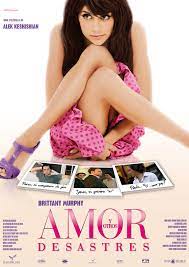
LOVE AND OTHER DISASTERS
UK, 2006, 90 minutes, Colour.
Brittany Murphy, Matthew Rhys, Catherine Tate, Santiago Cabrera, Elliot Cowan, Stephanie Beecham, Jamie Sives, Will Keen, Michael Lerner, Dawn French, Richard Wilson, Adam Reina, Angus Dayton, Gwyneth Paltrow, Orlando Bloom.
Directed by Alek Keshishian.
It would seem that writer-director Alec Keshishian (who had a 30 year career of doing music videos for such talent is Robbie Brown, Elton John, Madonna, Selena Gomez) had an eye on Richard Curtis’ screenplay for Love, Actually. In fact, there is a clip in this film from his screenplay of Notting Hill. There are also scenes from breakfast at Tiffany’s and replays of Moon River.
There are several stories going on at once in the screenplay, but the principal focus on Jacks, on the staff at Vogue Magazine, supervising fashion photography. She is played with verve by Brittany Murphy (sadly dying three late years later after the release of this film). The other focus of attention is on Peter, gay writer (Matthew Rhys before he went to the US and became prominent on television with The Americans and Perry Mason). Jacks is in a relationship with her former boyfriend and seems unable to get out of it. Peter has relationships in his imagination.
Also in the cast is Catherine Tate, well-known for her television satirical performances. Santiago Cabrera is the leading man. Audiences will be pleased with cameos from a range of character actors including Stephanie Beecham is Catherine Tate’s dominating mother, Michael Lerner is a bombastic Hollywood producer (did the filmmakers have Harvey Weinstein in mind at that time), Dawn French as a therapist who is not unlike her Vicar of Dibley persona, and Richard Wilson, doing an acerbic One Foot in the Grave turn as a marriage registrar.
The film acknowledges the conventions of romantic comedies, opening with screenplay instructions printed on the screen and ending in this way. The Hollywood producer wants big Hollywood style entertainment and romance in the characters remarking at times on what audiences might be expecting if this film were Hollywood romance. And, at the end, with the suggestion that Gwyneth Paltrow and Orlando Bloom could be the main characters, they actually appear at the airport climax!
The film struggles with heterosexual relationships – and there is quite some focus on gay relationships.
- Title? In relationship to all the characters? To the final screenplay in film?
- The London settings, flats, businesses and offices, fashion shoots, options, restaurants, hotel lobbies…? Atmosphere? And the musical score (and replaying Moon River)?
- The variety of characters, situations and interactions? Relationships? Straight relationships? Gay relationships? Tangles?
- Jacks’ story, her background, London and the US, her accent, her relationship with James, ex-boyfriend, but continued contact, his stands, love for Jacks or not? Her wanting to end the relationship but not succeeding? The work, her friends, the friendship with Tallulah and her eccentricities, her mother, coping with Tallulah? Sharing the flat with Peter, studying together, her encouraging him? Her friendship with Finley, the Gallery? Going to the exhibition of the pork carcasses? Sasha, the photo shoots, his moodiness, encountering Paolo, misinterpreting him, the later conversation, apology, dancing the Tango? Thinking him gay, encouraging Peter?
- Peter story, gay, journalism, the thwarted interview with the American producer, later meeting him, the screenplay, the producer wanting it very much more Hollywood? The encounter with the man who dropped the parcel, his misinterpretation of the address? Everybody telling David about Peter? Peter always missing him? The encounter with Paolo, the attraction, friendship, Paolo telling him he was straight? Dealing with Tallulah and her tantrums? Finally writing the screenplay?
- Tallulah, Catherine Tate’s comic style, eccentricities, the relationship with Freedom, his being married? The man on the phone from British Telecom? Her disdain for her mother? Have the auction, meetings of the dress? The collapse, Jacks and Peter looking after her?
- Tallulah’s mother, fashion, age, finance, the auction?
- Finley, the Gallery, gay, friendship with Peter?
- Paolo, Argentina, photography, his portfolio, realistic? Jacks misinterpreting his relationship, is trying to tell the truth and her continually interrupting? Her provocative behaviour with him, thinking he was gay? The encounters with Jacks, her apology, the Tango? His being reported to the authorities, deportation, Jacks proposal, the wedding ceremony, interrupted, Paolo leaving for the airport?
- Peter telling Jacks the truth, her fear of relationships? Going to the airport, missing Paolo? Her flight to Argentina?
- David, the encounter with Peter, the misinterpretation of his identity, the meeting with Tom, vain actor, the night with Peter, the chance encounter in the Underground with David, Peter following him, the relationship?
- The film, Gwyneth Paltrow and Orlando Bloom, everybody watching the film?
- Jacks pregnant, happy with Paolo, Peter and William, in the final screenplay indications and final shot?
Miss Marx
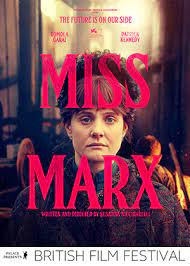
MISS MARX
Italy, 2020, 107 minutes, Colour.
Romola Garai, Patrick Kennedy, John Gordon Sinclair, Felicity Montagu, Karina Fernandez, Emma Cunniffe, Philip Groening.
Directed by Susanna Nicchiarelli.
Who is Miss Marx? She is Eleanor, the youngest daughter of the writer of Das Kapital, Karl Marx. The question occurs: do we know very much about Karl Marx himself, his background in Germany, his moving to England, his marriage, family, his writings? (There is an interesting film with August Diehl, The Young Karl Marx, 2017, directed by the Haitian Raoul Peck, this film career focused on social justice issues.) And we know less about Eleanor.
Here is an opportunity to learn something of the Marx family. And, we are offered a portrait of Eleanor, as daughter of the celebrity thinker, in her own right, her beliefs, social work and commitments.
The film has been written and directed by the Italian director, Susanna Nicchiarelli (who has gone on to make Chiara, the story of St Clare and the influence of Francis of Assisi). She has assembled an international cast, principally British, with Romola Garai in the central role, a strong screen presence, commanding when she appears, a significant woman socialist campaigning in late 19th century Britain.
In fact, the film opens with the funeral of Karl Marx, Eleanor speaking of her father and his memory. There are a number of flashbacks throughout the film, some genial memories of Marx himself, but the opening up of some secrets. The screenplay fills in a lot of family background, Eleanor’s sisters, deaths in the family, nieces and nephews.
At the time of the funeral, 1883, Eleanor met the playwright Edward Aveling and fell in love with him. Previously married with his wife refusing to divorce him, Eleanor decided to it herself for them to live as husband and wife. Romola Garai’s performance conveys the intense love she had for Edward – whereas, the audience watching him throughout the years, comes to dislike him intensely. He is self-centred, exploiting his wife, she, despite loving him, declares that he has no moral sense. He is the charming, self-preoccupied, cad, played by Patrick Kennedy.
So, while the film, in six chapters highlighting special times from 1883 to 1898 in Eleanor’s life, provides a portrait of Elenor and her personality, strength of mind, strength of will, perpetually forgiving, it also offers an opportunity to see the influence of Karl Marx’s thinking, theoretical socialism and idealistic hopes for society, but also the practical applications, Eleanor visiting working sites, meeting strikers, protesting injustice, visiting the US and continuing campaigns there, support for the suffragettes and the women’s movement.
There is a vigorous singing of the Internationale during the film – during the final credits.
For audiences who have not knowing anything about Eleanor Marx’s life, best not to do any research before seeing the film to let his have its ultimate dramatic impact. But, after watching the film, she is well worth researching to discover a strong-minded and strong-willed 19th century British woman.
- Audience knowledge about Eleanor Marx, her life, relationship with her father, his ideas and ideals, her social work and protest?
- Britain, 1883 to 1998, London, homes and flats, the countryside, protests, workers and strikes, the visit to the US, social conditions in the US? The musical score?
- Audience familiarity with Karl Marx, Das Kapital, his ideas, his background in Germany, moving to England, his wife, Helen, relationships, children? The film opening with his burial, Eleanor is tribute to him? Friedrich Engels, the other friends, relatives?
- The portrait of Eleanor, Romola Garai and her interpretation, age at the time of her father’s death, her having given her life so far to him and his ideals, protests and social concern? The encounter with Edward, falling in love, his not being divorced, the decision to live with him as husband and wife, no children? His accompanying her everywhere?
- Audience interest in and sympathy for Edward? Growing antipathy? His personality, his plays, stagings, success? Past marriage, no divorce? The relationship with Eleanor, love, accompanying her to the US, the continued flowers, the revelation of his non-awareness of money and its value? His presence over the years, friends and relatives wary of him? His absences, to write, to go to the coast? The revelation about the young woman that he married, confidence man? The strains in the relationship with Eleanor, her knowledge of his behaviour, his not contacting her, saying he did not want to worry her? His increasing ill-health? Friends advising her against him? The portrait of a callow man and Eleanor saying he had no moral sense?
- The various years, the chapter headings for the film? Eleanor as a person, personal growth, awareness? The causes, going to the factory, meeting the workers? The suffragettes?
- The family, relationships, the death of her sister, the nephew, his staying with Eleanor and Edward, liking being with them? His father? The older sister, her appearance, practical, her concern about Eleanor? The other relations, suspicions in the family? The friendship with Engels? Confronting him about not telling the truth about her father and Helen? The friendship with Helen?
- The friendship with Olive Schreiner, Havelock Ellis, their reputations in British history, South Africa? The episode with the drugs?
- The passing of the 15 years, the effect on Eleanor? Disappointment with Edward? Visiting the pharmacy, the pills?
- The musical score throughout, the classical music, champagne, the variations? The contemporary 21st-century music, as background, mood, a modern perspective on 19th century characters and action? The final frantic dance, Eleanor and the gyrations, a symbol of what was happening interiorly? Her suicide?
- The final information? Portrait of Eleanor and a tribute to her?
Lady Boss, the Jackie Collins Story
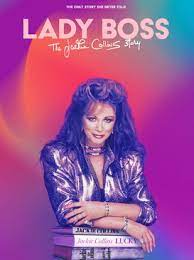
LADY BOSS: THE JACKIE COLLINS STORY
UK, 2021, 96 minutes, Colour.
Directed by Laura Fairrie.
Jackie Collins, bestselling novelist (and usually spoken of in connection with her older sister, actress, Joan Collins).
Perhaps this is all we need to know about Jackie Collins, her life, her books, her celebrity, her relationships and family. However, fans of her writing will want to know more about her glamorous life, the influence of this life on her books. There are many sequences throughout the film where long lines of fans wait their turn to get their books signed, and a chat with Jackie Collins herself, always obliging.
Jackie Collins was certainly a celebrity. She began writing at an early age, writing her diary is in the film we gives quite some attention to episodes in the diaries, and the visuals of those entries. While she had started to write some stories, it was only when she married her second husband, club-owner, older, Oscar, who is devoted to her for over 20 years, that he discovered a manuscript and urged her to write. She was successful in finding a publisher for The World is Full of Married Men, moderately successful in sales, then going on to write more.
In her early years, Jackie Collins was always in the shadow of Joan who appeared in British films, went very young to the United States for a successful career in film, then some decline, and then Dynasty and American television. Jackie Collins wanted to be an actress, did some training, some small roles, but not successful. However, after the publication of the novels and Joan getting finance for films, she was advised to go to the United States. No looking back, Oscar very supportive and their taking the children. (And it is significant that Jackie Collins’ three daughters are interviewed extensively for this documentary and very praising of their mother.)
With books like Hollywood Wives and then Jackie writing the screenplay as she did for other television series, she became a top bestseller. And she with the glamorous life, many friends, celebrities, and this documentary includes many clips of television interviews.
She took the death of Oscar very hard but then teamed up with a Playboy, Frank (with sad echoes of her first brief marriage to another Playboy who eventually killed himself). The daughters did not approve of Frank. However, he also died from cancer.
Towards the end of the film there are interesting discussions with a television host and an audience which is generally hostile to her books, considering them trash, disgusting… And not afraid to say that to her on television. She defended herself as saying that she wrote the books to describe women doing what men did without recrimination, feminist in that sense, although some of the critics noted that all her women protagonists were glamorous and wealthy and, perhaps, somewhat subjugated in their relationships with the men.
Another difficulty with Jackie Collins writing is that it is unadorned prose, straightforward sentences, this happens, this happens, then that happens, no unexpected imaginative adjectives or adverbs!
Joan Collins herself, seated like the grand dame that she is, reflecting on his sister, praising her acknowledging moments of rivalry. There are also many other friends and celebrities, one of whom noted that Jackie lived in Jackie land behind her facade.
I am Mortal
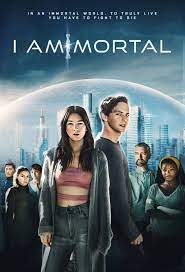
I AM MORTAL
US, 2021, 83 minutes, Colour.
Abraham Lewis, Eloise Smyth, Sean Gunn, Lauren Lindsey Donzis, John Harlan Kim.
Directed by Tony Aloupis.
A brief futuristic film, aspects of science-fiction, aspects of philosophical and religious speculation. It has divided bloggers, some condemning the small-budget treatment, others praising the imagination but, more importantly, some praising the issues raised while others are quick to condemn as Christian propaganda.
There is a basic premise, that a scientist made a discovery that could enable everyone to be immortal. And, by and large this has happened with the population 200 years into the future. However, as with this kind of film, there is always a group of rebels, denouncing the effect of immortality and the leader, The Pilot, who has taken control of the way people live. However, the immortality does depend on some medication – and the promise that when the person has achieved highest peak, they will be frozen.
While there is some attention given to The Pilot, his speeches to the population, his interactions with the young woman protégé who has become immortal, attention is also given to a young woman who takes groups on tour of the laboratories and a young man who takes the medication and is about to make a decision about his being frozen.
The group of rebels approach him to persuade him about the disastrous impact of immortality. There is a lot of discussion, perhaps holding up the action, about immortality in this vein stopping all exercise of free will, choices, personal fulfilment. The young man is persuaded, is taken over by The Pilot, but, with the help of the guide who comes to see the light, the young man will be saved.
In fact, some of the discussion does sound like discussions about these and atheism, and the role of free will. In times of crisis, people always ask where is God and why doesn’t God intervene to save everyone. In the screenplay, The Pilot then becomes the equivalent of a God-figure who does intervene, saves everyone from war, illness, giving them immortality – but, the thesis of the screenplay is that it is far better to have free will, to make personal choices, than to be absolutely controlled.
Interesting to ask who was the target audience for this film, older audiences perhaps dismissing the science fiction aspects, but younger audiences perhaps reflecting on some of the issues of the dialogue.